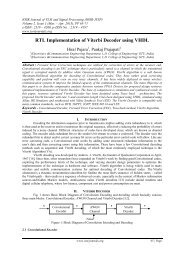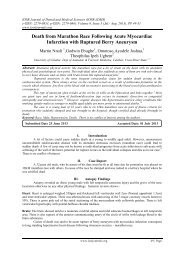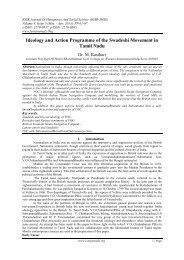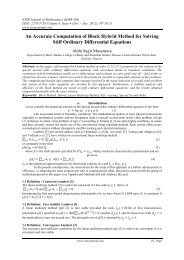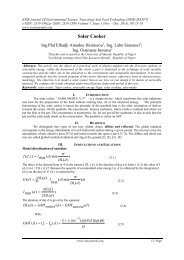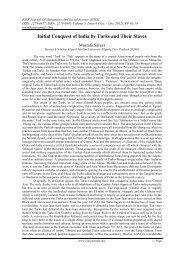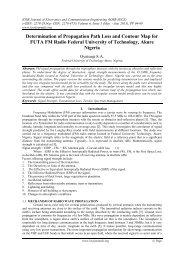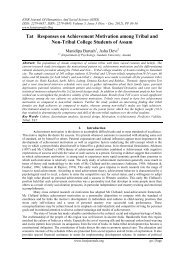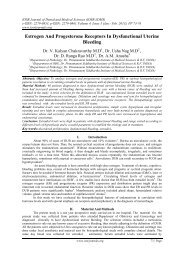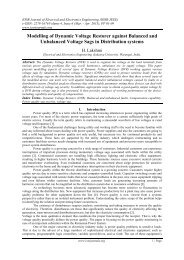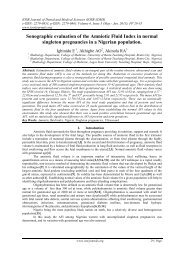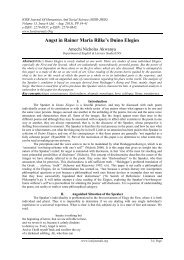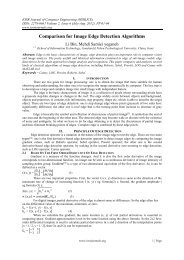Design Compatibility of Classroom Furniture in Urban and ... - IOSR
Design Compatibility of Classroom Furniture in Urban and ... - IOSR
Design Compatibility of Classroom Furniture in Urban and ... - IOSR
You also want an ePaper? Increase the reach of your titles
YUMPU automatically turns print PDFs into web optimized ePapers that Google loves.
Div<strong>in</strong>e Revelation <strong>in</strong> Yoruba Traditional Religion <strong>and</strong> In Christianity<br />
idea that revelation, so understood, ended with the last apostle <strong>and</strong> was stored <strong>in</strong> a „deposit <strong>of</strong> faith‟ rendered<br />
revelation someth<strong>in</strong>g static, past, <strong>and</strong> closed.<br />
One would th<strong>in</strong>k that religious persons would fossilize if God were to stop illum<strong>in</strong>at<strong>in</strong>g them at any<br />
po<strong>in</strong>t <strong>in</strong> history. For <strong>in</strong>stance, the Jews were said to be miserable when God would not send them prophets<br />
(Psalm 74 :9). The human agents <strong>of</strong> div<strong>in</strong>e revelation <strong>in</strong> the Old Testament were, basically, the prophets. The<br />
Lord Jesus Himself was said to be a prophet, as well as be<strong>in</strong>g the Messiah. But, <strong>in</strong> the New Testament, God is<br />
said to have guided His people through the Apostles. Even Sa<strong>in</strong>t Paul, who was not a disciple <strong>of</strong> Jesus Christ <strong>in</strong><br />
His earthly m<strong>in</strong>istry, called himself an apostle, rather than a prophet as such (cfr., for <strong>in</strong>stance, Rm. 1:1). The<br />
words “prophet” <strong>and</strong> “apostle” are, however, not to be counter-posed, s<strong>in</strong>ce the apostles were known to have<br />
performed prophetic roles.<br />
Equally worthy <strong>of</strong> note is that many theologians today do not believe that there are impeccable agents<br />
<strong>of</strong> God, both <strong>in</strong> the Bible <strong>and</strong> outside <strong>of</strong> it. In that respect, Riffel (1978:39) notes, for <strong>in</strong>stance, that all who<br />
heard from God needed “correction, repro<strong>of</strong>, or confirmation, just as we do.” As he further notes, the fact that<br />
the Old Testament conta<strong>in</strong>s no pretext that the prophets were more than human be<strong>in</strong>gs is testified to by such<br />
stories as the <strong>in</strong>ability <strong>of</strong> Samuel to recognize the voice <strong>of</strong> God (1Sm. 3:1-14). And, <strong>in</strong> his epistle, Sa<strong>in</strong>t James<br />
notes that “Elijah was a human be<strong>in</strong>g like ourselves” (James 5:17). Likewise, Sa<strong>in</strong>t Peter was rebuked several<br />
times by the Lord Jesus (cf. for <strong>in</strong>stance, Luke 22:31-34 & John 13:36-38). Beyond that, he was said to have<br />
denied know<strong>in</strong>g Jesus Christ three times, at the critical moment <strong>of</strong> the latter‟s travail. It is <strong>in</strong>terest<strong>in</strong>g to note<br />
that the story is carried by all the Gospel accounts (Mt. 26:69-70; Mark 14:66-68; Luke 22: 57-59; <strong>and</strong> John<br />
18:17-18). On one occasion, Peter was also seriously rebuked by Paul (cfr. Gal. 2:14). It should not be<br />
forgotten that Peter is only be<strong>in</strong>g used as a case study to emphasize that biblical agents <strong>of</strong> God were human<br />
be<strong>in</strong>gs <strong>in</strong> every sense <strong>of</strong> the word. Another typical example is Paul who spoke about the s<strong>in</strong>ful nature <strong>of</strong> human<br />
be<strong>in</strong>gs as it applied to himself personally (Rms. 7:18 - 20).<br />
The hagiographers who were the authors <strong>of</strong> the books <strong>in</strong> the Bible are believed to be <strong>in</strong>spired by God<br />
who imbued them with <strong>in</strong>errancy. In his second letter to Timothy, Paul ma<strong>in</strong>ta<strong>in</strong>s that: “All scripture is <strong>in</strong>spired<br />
by God <strong>and</strong> can pr<strong>of</strong>itably be used for teach<strong>in</strong>g, for refut<strong>in</strong>g error, for guid<strong>in</strong>g people‟s lives <strong>and</strong> teach<strong>in</strong>g them<br />
to be holy” (2Tim. 3:16). It would seem, nevertheless, that many biblical scholars today are <strong>of</strong> the op<strong>in</strong>ion that<br />
while the scripture conta<strong>in</strong>s the fundamental truth that can lead one to salvation, some elements <strong>of</strong> imperfection<br />
cannot be ruled-out, based on human limitation. As Murphy (1978:69) expla<strong>in</strong>s, for <strong>in</strong>stance, “the human<br />
author is not shunted <strong>in</strong>to the background”, <strong>and</strong> so, the Scripture constitutes “the product <strong>of</strong> God <strong>and</strong> <strong>of</strong> man.”<br />
Underst<strong>and</strong>ably, s<strong>in</strong>ce no human be<strong>in</strong>g is believed to be perfect, <strong>and</strong> the hagiographers enjoyed their<br />
autonomy <strong>in</strong> the choice <strong>of</strong> method <strong>and</strong> materials, the Scripture cannot be said to be the simple word <strong>of</strong> God. A<br />
typical example <strong>of</strong> the human element is when Sa<strong>in</strong>t Paul forbids women from speak<strong>in</strong>g <strong>in</strong> the assembly <strong>of</strong><br />
God‟s people, <strong>and</strong> that they should not give any teach<strong>in</strong>g to their husb<strong>and</strong>s (cf. 1Cor. 14:34-35, 1Tim. 2:12 -<br />
15). That <strong>in</strong>struction from Paul might have been culturally expedient <strong>and</strong> wise <strong>in</strong> his own milieu, but that is not<br />
the case <strong>in</strong> most contemporary situations, <strong>in</strong> which there are female ecclesiastical overseers or bishops, <strong>and</strong><br />
pastors <strong>of</strong> various categories, who lead liturgical services, <strong>and</strong> render brilliant homilies, <strong>of</strong>fer exhortations,<br />
<strong>in</strong>structions <strong>and</strong> <strong>in</strong>junctions. Holman Illustrated Bible Dictionary (2003:825) notes that “normally God used His<br />
chosen writers‟ personalities, theological meditations, <strong>and</strong> literary styles.” In other words, God never wrote<br />
directly by Himself.<br />
On another note, there has been some attempt to review the traditional underst<strong>and</strong><strong>in</strong>g that God‟s most<br />
def<strong>in</strong>itive <strong>and</strong> f<strong>in</strong>al revelation has taken place <strong>in</strong> Jesus Christ, through the Incarnation. In the words <strong>of</strong> Scanlon<br />
(1984:747):<br />
Thanks to the biblical scholarship <strong>of</strong> the twentieth century, we now have significant knowledge about<br />
Jesus <strong>of</strong> Nazareth. This knowledge <strong>in</strong>forms contemporary attempts to construct a theocentric Christology<br />
where<strong>in</strong> the fundamental issue is not the div<strong>in</strong>ity <strong>of</strong> Christ but the k<strong>in</strong>d <strong>of</strong> God disclosed by Jesus <strong>in</strong> his words,<br />
deeds, <strong>and</strong> dest<strong>in</strong>y.<br />
One would th<strong>in</strong>k that this new perspective <strong>of</strong> the reality <strong>of</strong> Jesus makes a cont<strong>in</strong>ual search for God<br />
necessary <strong>in</strong> <strong>and</strong> outside <strong>of</strong> Christianity, <strong>in</strong> <strong>and</strong> outside <strong>of</strong> the Bible, to <strong>in</strong>clude human encounters, <strong>and</strong> certa<strong>in</strong><br />
historical events that are experienced by <strong>in</strong>dividuals, social groups, communities <strong>and</strong> societies that believe <strong>in</strong><br />
God as the supreme Lord <strong>of</strong> history. For <strong>in</strong>stance, it is possible to experience God‟s love <strong>in</strong> one‟s neighbour. A<br />
person can also experience God‟s almight<strong>in</strong>ess <strong>in</strong> the fall <strong>of</strong> a supposedly powerful man or woman. Some<br />
illness may be the route to some discovery about God for some people. Failures <strong>and</strong> successes <strong>and</strong> awareness <strong>of</strong><br />
happen<strong>in</strong>gs around can serve as private modes <strong>of</strong> div<strong>in</strong>e revelation for those who are disposed to knowledge <strong>of</strong><br />
God. Some people also claim to have div<strong>in</strong>e revelations through dreams <strong>and</strong> visions. All these may be termed<br />
subjective, without suggest<strong>in</strong>g that they are impossible or false <strong>in</strong> every case.<br />
www.iosrjournals.org<br />
72 | Page



